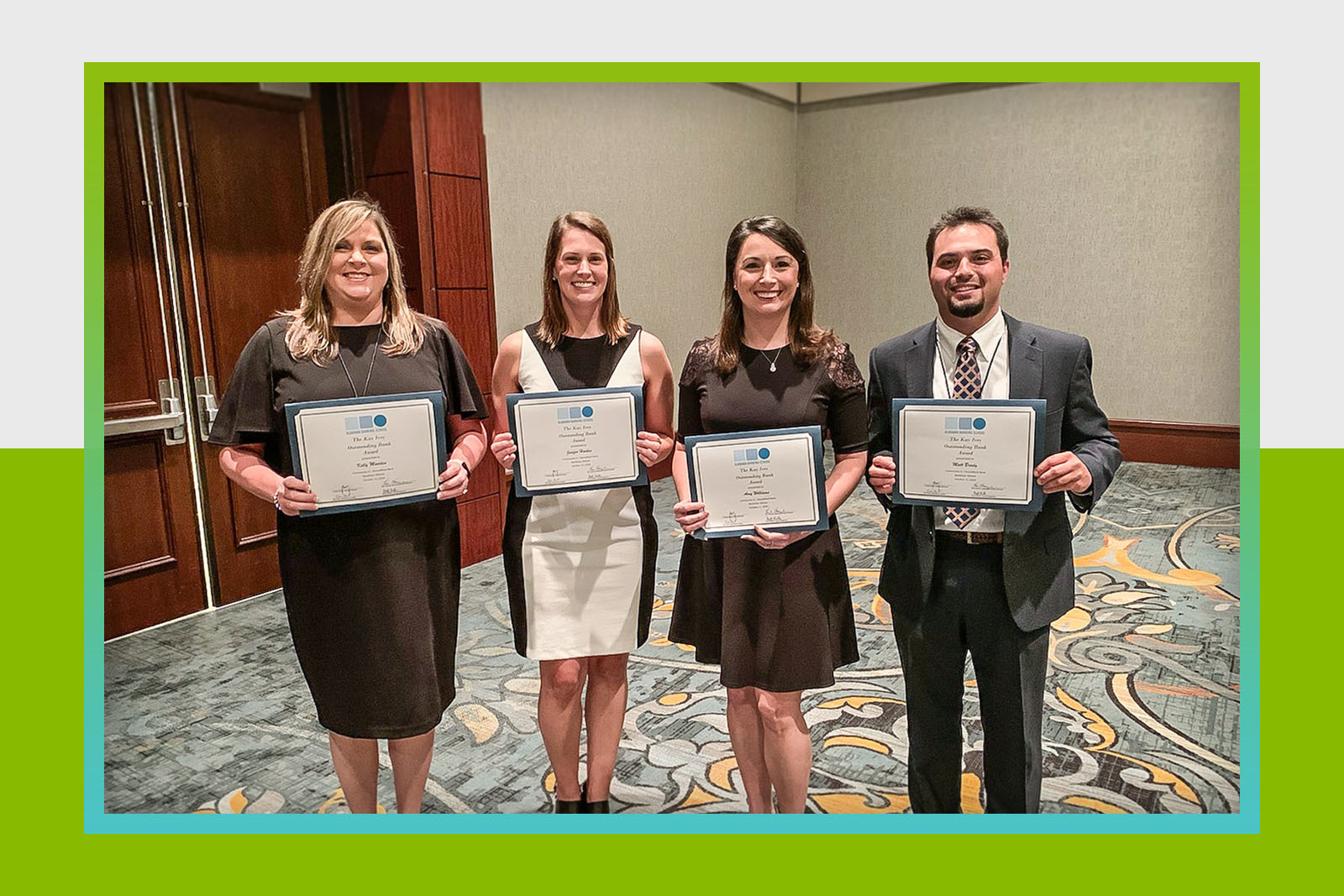For years, Jenifer Harbin watched the Alabama Banking School from afar, waiting for her opportunity to join banking peers across the state for the opportunity to grow in her profession.
“I just knew this was something special,” Harbin explained. “But it’s not until you participate that you realize these opportunities are out there to grow and network.”
Patience paid off for the assistant cashier and assistant investment officer at State Bank & Trust in Winfield, Alabama. Appointed by her former bank in 2018, she recently graduated from the intensive three-year Alabama Banking School program that’s designed to create better bankers and build stronger communities.
And she did it with an assist from a Regions banker.
Hollins Rush, a wealth advisor for Regions based in Mountain Brook, a Birmingham suburb, served as “Class Dad” for Harbin and her fellow students. It’s a leadership role for prior graduates – Rush completed banking school in 2016 – who serve as mentors and instructors during the highly detailed coursework around helping people and businesses reach financial goals.
“The ask was for me to come back and get involved with higher-level decision making with the Alabama Bankers Association, to be involved with leadership in various banking roles across the state, and to coach and mentor young bankers,” Rush said. “I wanted to hone my leadership skills, and this was a great opportunity.”
Harbin’s class marked the latest to graduate from the Alabama Banking School, which began 45 years ago in Mobile. Charter members who put the first school together included a young teacher turned banker named Kay Ivey, now the governor or Alabama.
We aren’t competing against each other. Instead, we’re fighting the same battles together, and helping each other out.Scott Miller on the Alabama Banking School
Each year, a new class is taken from applications across the state to train the next generation of banking leaders.
“The structure of the school is run by bankers and coordinated by the association,” explained Scott Miller, the executive director of the Alabama Multifamily Loan Consortium. “We invite graduates back to help lead, so that each freshman class is met with two graduates – one male ‘Class Dad,’ and a female ‘Class Mom.’
“Hollins was a natural choice. He’d graduated from the school; he had been social chair and he’s truly a social butterfly. It was a good fit for an important role.”
Especially in 2020.
 Jenifer Harbin (second from left) with her winning team (Kelly Madison of Trustmark National Bank, Amy Williams of BancorpSouth, and Matt Brady of West Alabama Bank) after their winning presentation at Alabama Banking School
Jenifer Harbin (second from left) with her winning team (Kelly Madison of Trustmark National Bank, Amy Williams of BancorpSouth, and Matt Brady of West Alabama Bank) after their winning presentation at Alabama Banking School
Before, Alabama Banking School was held during the early summer on the campus of the University of South Alabama, where the Mitchell School of Business hosted students from banks big and small for their annual coursework as part of the three-year program.
But amid the pandemic, and with access on campus limited, in-person learning was moved to a week in the fall at the Renaissance Hotel in Montgomery. Utilizing masks and social distancing, the schedule remained grueling, with sessions starting at 8 a.m. and going as late as 8:30 or 9 at night.
That meant extra work not only for students, but the Class Dad and Mom.
“There’s just so much going on in a short period of time, but Hollins kept us in line, made sure we were where we needed to be,” Harbin said. “He mentored us when we were working on our bank presentation, then offered suggestions on how to improve.”
Classes are designed to expand knowledge through teamwork.
The question, then: Why do competing banks come together to improve their market rivals?
“Our slogan is bankers teaching bankers,” Miller pointed out. “Our Class Moms and Dads are part of the faculty, providing instruction and helping create a network throughout the state. We tell them that the most valuable insight you’ll gain is creating a network that you can lean on in a pinch.
“We aren’t competing against each other. Instead, we’re fighting the same battles together, and helping each other out. That benefits all of us, as well as our communities.”
While Regions doesn’t have a branch in Harbin’s hometown, it remains the largest bank in Alabama with locations across the state.
Like Miller, she doesn’t see an issue.
“At banking school, you work together as a team. You’re not competitors. Even now, we continue to reach out and ask fellow classmates questions,” Harbin said. “For example, what core processor do you use? How are you handling COVID? Are your lobbies still open?”
But the teamwork doesn’t come without some intense moments. Harbin remembers her first year being difficult due to the academic demands.
“Honestly, you’re in tears at the end of class that first year because you have so much information thrown at you,” Harbin said. “You’re learning about areas of the bank you’ve never worked with – whether it’s debts and credits or the loan process. On top of that, you’re away from your family. It’s hard.”
That’s where the Class Dad comes in.
“It can be very difficult,” Rush said. “My job is to help them get acclimated and help them realize they’ve got this. There’s so much value to this, and there’s personal satisfaction seeing the growth of bankers like Jenifer from Day One to graduation.”
Harbin is appreciative of the support.
“Rush was truly great at making us feel welcome and giving us encouragement, from a high five or a friendly greeting the first year to getting us to participate in extracurriculars like dodgeball and kickball our second year,” Harbin said. “He made us feel we could do things we never thought possible, from running a bank to winning the presentation our third year. He was a great mentor.”